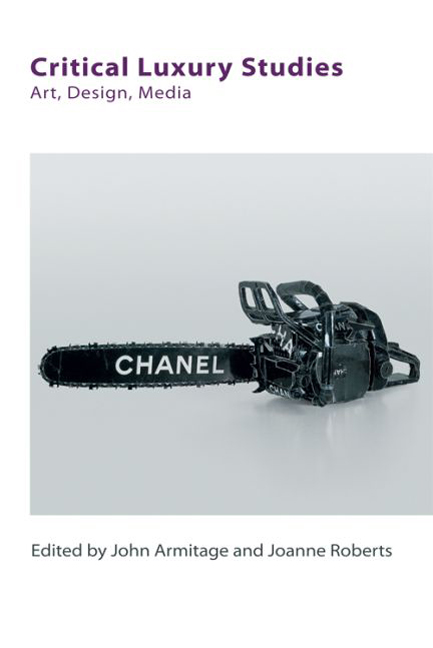Book contents
- Frontmatter
- Contents
- List of Figures
- List of Tables
- Series Editors’ Preface
- Acknowledgements
- Notes on Contributors
- 1 Critical Luxury Studies: Defining a Field
- I CRITICAL LUXURY STUDIES
- 2 Knowing Luxury: From Socio-Cultural Value to Market Price?
- 3 Luxury: A Dialectic of Desire?
- 4 The Luxury Duality: From Economic Fact to Cultural Capital
- 5 ‘Life's Little Luxuries?’ The Social and Spatial Construction of Luxury
- 6 The Object and Art of Luxury Consumption
- II ART, DESIGN, MEDIA
- Index
5 - ‘Life's Little Luxuries?’ The Social and Spatial Construction of Luxury
from I - CRITICAL LUXURY STUDIES
Published online by Cambridge University Press: 23 September 2017
- Frontmatter
- Contents
- List of Figures
- List of Tables
- Series Editors’ Preface
- Acknowledgements
- Notes on Contributors
- 1 Critical Luxury Studies: Defining a Field
- I CRITICAL LUXURY STUDIES
- 2 Knowing Luxury: From Socio-Cultural Value to Market Price?
- 3 Luxury: A Dialectic of Desire?
- 4 The Luxury Duality: From Economic Fact to Cultural Capital
- 5 ‘Life's Little Luxuries?’ The Social and Spatial Construction of Luxury
- 6 The Object and Art of Luxury Consumption
- II ART, DESIGN, MEDIA
- Index
Summary
While Berry (1994) and others identify the social and historical construction of luxury, little scholarly attention has been given to how luxury has been practised in particular places. Indeed, most contemporary literature on luxury focuses on the attributes of commodities (be they experiences, services or tangible goods) and those commodity practices favoured by wealthy consumers. Examining how luxury is understood beyond the realms of the wealthy is an important but neglected area of critical luxury studies. Consideration of how luxury is talked about and practised in the day-to- day lives of consumers, who range from the wealthy to those experiencing relative poverty, can provide insights into the kinds of contextual and moral factors which both produce and reinforce discourses and practices of luxury. Recognising the heterogeneity of luxury and the ways it is shaped by, and for, a range of consumers also enables us to understand how material contexts matter for what counts as luxury. Critical studies of luxury consumption must consider how temporal and geographical contexts are implicated in the construction of luxury.
In this chapter we consider how the concept of luxury is deployed in both talk and practice. Drawing on qualitative interviews with older New Zealanders from a range of socio-economic positions, ethnic groups and geographic locations across New Zealand, we demonstrate how understandings of luxury are materially grounded and morally constituted. This work provides some insights into how and why constructions of luxury are drawn upon to describe a range of consumption practices, and vary across people, place and time. By examining the heterogeneity and construction of luxury beyond the consumption practices of the wealthy, we demonstrate that a ‘little bit of luxury’ in everyday life matters and more critically reveals how the manifestations and moralities of luxury consumption vary greatly.
Situating Luxury in Time and Place
As already identified in this present volume (pp. 1–21), many studies of luxury centre on the price, quality, rarity, uniqueness, exclusivity, artisanship and aesthetic characteristics of luxury commodities, be they services or things (Hemetsberger, von Wallpach and Bauer 2012). For the individual, luxury is seen as a source of pleasure (Berg 2005), indulgence and desire (Kemp 1998).
- Type
- Chapter
- Information
- Critical Luxury StudiesArt, Design, Media, pp. 88 - 107Publisher: Edinburgh University PressPrint publication year: 2016



